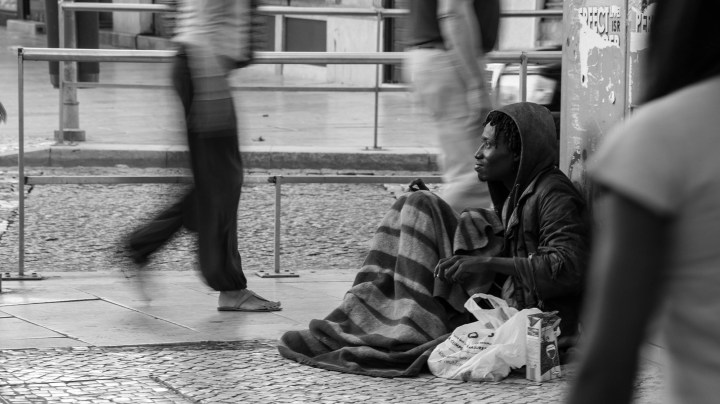OP-ED
Court gives glimmer of hope to street people and the homeless

The most common response of cities, and of their metropolitan police forces, is to treat homeless people, and others who ply their trade or live on the streets, as criminals. A ruling by the Supreme Court of Appeal has brought new hope to South Africa’s dispossessed.
On 3 April 2019, the Supreme Court of Appeal in Ngomane & others v City of Johannesburg Metropolitan Municipality & another (734/2017) [2018] ZASCA 57 censured the City of Johannesburg for its treatment of homeless people in a raid where their property, primarily materials to construct shelter, was confiscated. The court declared the conduct of the Metropolitan Police unlawful and inconsistent with the Constitution.
The court upheld homeless people’s right to dignity, privacy and not to be deprived of their property. It said that “the conduct of the respondents’ personnel was not only a violation of the applicants’ property rights in their belongings but also disrespectful and demeaning. This obviously caused them distress and was a breach of their right to have their inherent dignity respected and protected”.
This decision should not be surprising, considering that courts have consistently found similar conduct unlawful.
For example, in Makwickana v Ethekwini Municipality and Others 2015 (3) SA 165 (KZD), the Durban High Court declared the Metro Police’s confiscation of traders’ goods under the eThekwini by-laws as unconstitutional.
In 2009, the Durban High Court granted an interdict against enforcement of permit requirements for barrow operators in Warwick junction under the by-laws when the vaunted Early Morning Market was slated for redevelopment as a mall. Fortunately, litigation halted the development and the consequent displacement and threat to the livelihood of thousands of informal traders and approximately 70,000 households.
The Navi Pillay Research Group (NPRG) in the School of Law, University of KwaZulu-Natal, is concerned that the eThekwini municipality continues to use irrational and vaguely termed municipal by-laws to victimise and unfairly discriminate against homeless people, evidenced through Human Sciences Research Council’s research, investigative journalism and allegations raised through the outreach work of the Denis Hurley Centre.
This leaves the promotion of “public order” and determining what constitutes “public nuisance”, “loitering” or “vagrancy” to the discretion of officials and Metropolitan Police (for example, urinating, bathing or sleeping in public).
It also gives them impunity as to who to arrest, detain, abuse and remove vulnerable members of society, confiscate and destroy their property, without following due and fair procedure extended to other citizens, simply because they can get away with it. This is unlawful discrimination and a violation of the right to equality and dignity.
The NPRG is particularly concerned to note so-called “clean-up” operations before international conferences and events, and allegations of abduction and dumping of homeless people and street children. This conduct constitutes a criminal justice and policing response to essentially socio-economic issues: Criminalising and stigmatising poverty and homelessness through the prohibition of begging and loitering, and adopting “anti-vagrancy” measures.
Municipal by-laws, policies and actions that perpetuate discrimination against vulnerable groups such as homeless people are simply unconstitutional.
The question remains: How do cities accommodate all categories of citizens and respect the rights of informal traders, homeless people, street children and sex workers?
We call for the development of a rights response — not a criminal justice or even a welfare response. The state is obliged by the Constitution and international conventions to prioritise communities’ needs, particularly those of the most vulnerable groups of people, and enact positive measures to address, for instance, causes of homelessness, and ensure progressive attainment of socio-economic rights (housing, food, water, sanitation, healthcare services, social security and education).
This principle has been successfully tested and upheld in the courts, which have obliged municipalities to give effect to their development mandate, respond to the needs of the most vulnerable groups, and afford them “sufficient care, respect and dignity” in the case of Dladla v City of Johannesburg [2017] ZACC 42.
In eThekwini and other urban centres, provision of adequate shelters and regulation of private shelters is imperative. The narrative of the social ills of homelessness has to change — people do not choose to live without a roof over their head, in abject poverty or to be denied their right to dignity.
That narrative, we argue, includes suburban businesses and families who often bemoan the criminal element of “vagrants”, seeking to remove these undesirable elements from their neighbourhoods. In the Ngomane case, it was complaints from business owners that instigated the raid.
We call for affording all who live within the limits of our cities the dignity to which they are entitled to under the Constitution. This will require a fundamental shift in policy and law. It will also require developing an acute awareness on the part of City officials, including the police and the public, that the right to the city extends to all those who live in it. DM
Willene Holness are Janine Hicks are, respectively, Senior Lecturer and Lecturer in the School of Law, University of KwaZulu-Natal, Durban. This opinion piece is written in their personal capacity and as members of the Navi Pillay Research Group (NRPG). The NRPG, comprised of academics from the School of Law, seeks to address critical emergent issues of race, class, gender and disability in post-apartheid South Africa through research, law and policy reform.

















 Become an Insider
Become an Insider